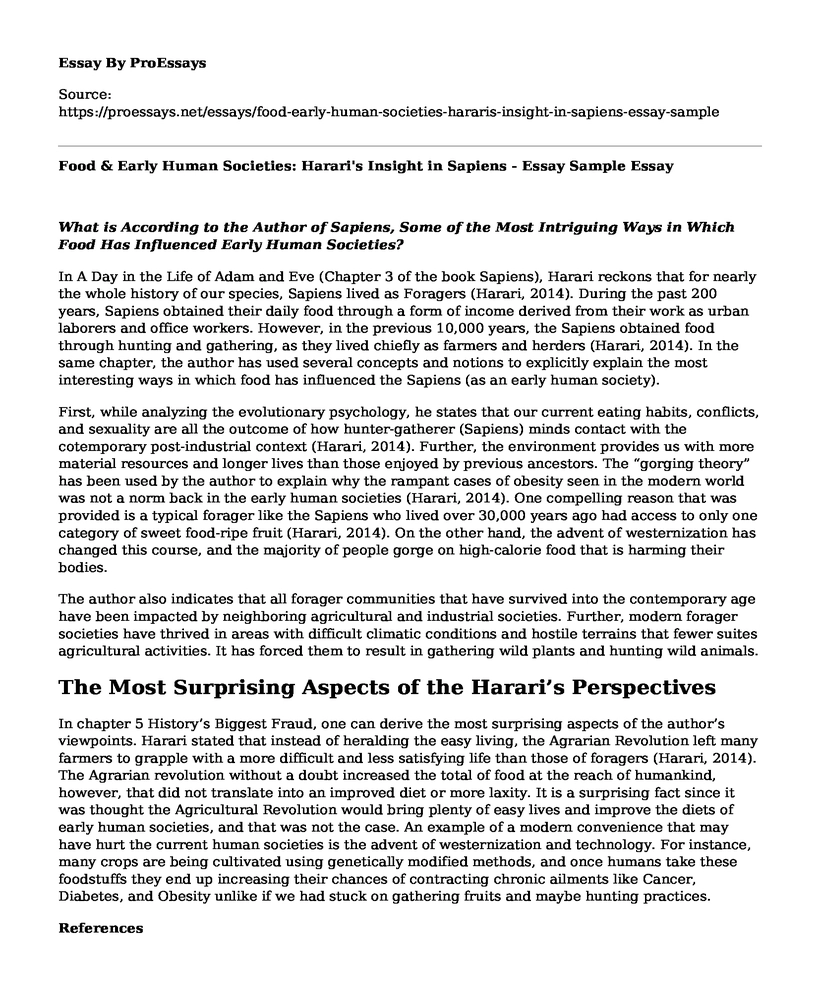What is According to the Author of Sapiens, Some of the Most Intriguing Ways in Which Food Has Influenced Early Human Societies?
In A Day in the Life of Adam and Eve (Chapter 3 of the book Sapiens), Harari reckons that for nearly the whole history of our species, Sapiens lived as Foragers (Harari, 2014). During the past 200 years, Sapiens obtained their daily food through a form of income derived from their work as urban laborers and office workers. However, in the previous 10,000 years, the Sapiens obtained food through hunting and gathering, as they lived chiefly as farmers and herders (Harari, 2014). In the same chapter, the author has used several concepts and notions to explicitly explain the most interesting ways in which food has influenced the Sapiens (as an early human society).
First, while analyzing the evolutionary psychology, he states that our current eating habits, conflicts, and sexuality are all the outcome of how hunter-gatherer (Sapiens) minds contact with the cotemporary post-industrial context (Harari, 2014). Further, the environment provides us with more material resources and longer lives than those enjoyed by previous ancestors. The “gorging theory” has been used by the author to explain why the rampant cases of obesity seen in the modern world was not a norm back in the early human societies (Harari, 2014). One compelling reason that was provided is a typical forager like the Sapiens who lived over 30,000 years ago had access to only one category of sweet food-ripe fruit (Harari, 2014). On the other hand, the advent of westernization has changed this course, and the majority of people gorge on high-calorie food that is harming their bodies.
The author also indicates that all forager communities that have survived into the contemporary age have been impacted by neighboring agricultural and industrial societies. Further, modern forager societies have thrived in areas with difficult climatic conditions and hostile terrains that fewer suites agricultural activities. It has forced them to result in gathering wild plants and hunting wild animals.
The Most Surprising Aspects of the Harari’s Perspectives
In chapter 5 History’s Biggest Fraud, one can derive the most surprising aspects of the author’s viewpoints. Harari stated that instead of heralding the easy living, the Agrarian Revolution left many farmers to grapple with a more difficult and less satisfying life than those of foragers (Harari, 2014). The Agrarian revolution without a doubt increased the total of food at the reach of humankind, however, that did not translate into an improved diet or more laxity. It is a surprising fact since it was thought the Agricultural Revolution would bring plenty of easy lives and improve the diets of early human societies, and that was not the case. An example of a modern convenience that may have hurt the current human societies is the advent of westernization and technology. For instance, many crops are being cultivated using genetically modified methods, and once humans take these foodstuffs they end up increasing their chances of contracting chronic ailments like Cancer, Diabetes, and Obesity unlike if we had stuck on gathering fruits and maybe hunting practices.
References
Harari, Y. N. (2014). Sapiens: A brief history of humankind. Random House.
Cite this page
Food & Early Human Societies: Harari's Insight in Sapiens - Essay Sample. (2023, Aug 28). Retrieved from https://proessays.net/essays/food-early-human-societies-hararis-insight-in-sapiens-essay-sample
If you are the original author of this essay and no longer wish to have it published on the ProEssays website, please click below to request its removal:
- The Early Republic and American Civil War Essay
- Health Professional's Dilemmas Essay Example
- Essay Sample on Social Reform: A Movement for Change in Canada
- Essay on Social Comparison Orientation & Group Membership: Effects on Similarity-Attraction
- Essay Example on Aesir-Vanir War: Ancient Conflict of Norse Deities
- Essay Example on Beauty Beyond Looks: A Reflection on Definition
- Wells Fargo - Case Study Sample







